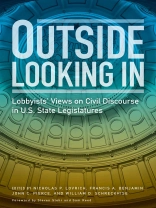The recent advent of gridlock and hyper-partisanship in the United States Congress has raised questions about whether similar divides are occurring in state governments, and if so, why? To find out, researchers—working in 2018 and 2019 under a National Institute for Civil Discourse (NICD) grant—conducted a survey of registered lobbyists and public agency legislative liaison officers in all fifty states. They received over 1, 200 completed surveys. The researchers hope that understanding reasons behind politicians’ inability to demonstrate civility and reach bipartisan agreements will yield effective, purposeful interventions.
In Outside Looking In, scholars from across the country interpret the survey results. Using a variety of lenses, they present unique perspectives, revealing both regional and national insights. Chapters address findings on a variety of topics, including effects of political culture heritage on perceptions of civil discourse phenomena and the impact of legislative professionalization; sentiments about civil discourse and perceptions of their own state legislature among lobbyists; a multivariate cross-state comparison of the relative impact of political culture, professionalism, and term limits; presumed and actual impact of term limits on civility; a comparison of lobbyists with and without prior legislative service; and effects of the rural/urban divide and state-level inequality across the states.
Also discussed are the efforts by the National Conference of State Legislatures to advance the cause of civil discourse, and NICD interventions to support civil discourse in state legislatures.
Offering rare insights on discourse in state legislatures, this work is a must-read for political science scholars studying state governments, state-level lobbying, and civility in government, as well as for state legislators and public interest groups committed to enhancing civility in government.
Содержание
Dedication and Tributes to Dr. Martha (Marty) Mullen
Acknowledgments
Foreword
Steven Stehr and Sam Reed
PREFACE I
Bradley Mc Millan, Craig Curtis, and Megan Remmel
PREFACE II
James R. Hanni
PREFACE III
Richard Kimball
Editors’ Introduction
CHAPTER 1
Political Culture, Historical Legacy, and Contemporary Levels of Civil Discourse in U.S. State
Legislatures: Evidence on Selective Impact vs Ubiquitous Penetration of Incivility in U.S. State Legislatures
Nicholas P. Lovrich and Christopher A. Simon
CHAPTER 2
The Connection between Legislative Professionalism and Legislative Civility
William D. Schreckhise and Francis A. Benjamin
CHAPTER 3
Nonprofits, Civility, and the Legislative Processes: Does Public Interest Lobbying Make a Difference?
John C. Pierce and Burdett Loomis
CHAPTER 4
Term Limits: Presumed and Actual Impact on Civility
William D. Schreckhise, Daniel E. Chand, and Francis A. Benjamin
CHAPTER 5
The Perspectives of Former State Solons: Comparing Revolvers with Other Lobbyists
Francis A. Benjamin and Briana M. Huett
CHAPTER 6
State Income Inequality and Incivility
Leanne S. Giordono, Brent S. Steel and Claire Mc Morris
CHAPTER 7
Rural and Urban Polarization and Civility in State Legislatures
Claire Mc Morris, Brent S. Steel and Leanne S. Giordono
CHAPTER 8
Modeling the Sources of Cross-State Differences in Legislative Civility
Luke Fowler, Stephanie L. Witt, and Jaclyn J. Kettler
CHAPTER 9
From the Inside Looking In: State Legislative Civility from a Practitioner’s Perspective
Karl Kurtz
CHAPTER 10
Encouraging Civility in State Legislatures: How to Train Legislators, and How to Measure the Results
Robert G. Boatright
CHAPTER 11
Summary Overview: Insights for Practitioners and Academics
John C. Pierce and Max Neiman
Contributors’ Biographies
Indexes
Об авторе
William Schreckhise is an associate professor and the chair of the Department of Political Science at the University of Arkansas. He received his Ph.D. from Washington State University and is the author of Evaluating American Democracy and Public Policymaking.












